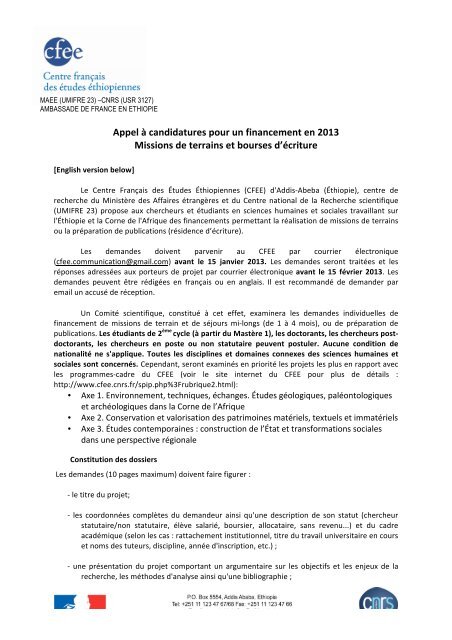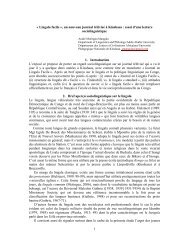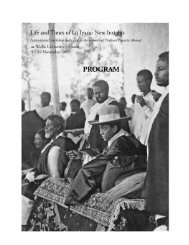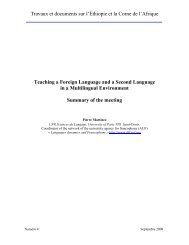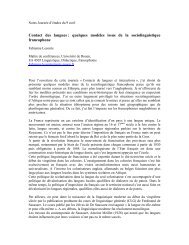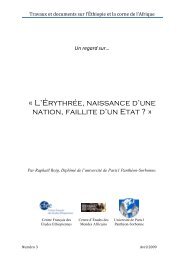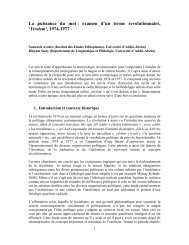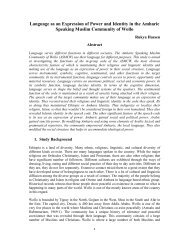Appel bourse CFEE 2013.pdf - Calenda
Appel bourse CFEE 2013.pdf - Calenda
Appel bourse CFEE 2013.pdf - Calenda
Create successful ePaper yourself
Turn your PDF publications into a flip-book with our unique Google optimized e-Paper software.
MAEE (UMIFRE 23) –CNRS (USR 3127)AMBASSADE DE FRANCE EN ETHIOPIE<strong>Appel</strong> à candidatures pour un financement en 2013 Missions de terrains et <strong>bourse</strong>s d’écriture [English version below] Le Centre Français des Études Éthiopiennes (<strong>CFEE</strong>) d'Addis-‐Abeba (Éthiopie), centre de recherche du Ministère des Affaires étrangères et du Centre national de la Recherche scientifique (UMIFRE 23) propose aux chercheurs et étudiants en sciences humaines et sociales travaillant sur l'Éthiopie et la Corne de l'Afrique des financements permettant la réalisation de missions de terrains ou la préparation de publications (résidence d’écriture). Les demandes doivent parvenir au <strong>CFEE</strong> par courrier électronique (cfee.communication@gmail.com) avant le 15 janvier 2013. Les demandes seront traitées et les réponses adressées aux porteurs de projet par courrier électronique avant le 15 février 2013. Les demandes peuvent être rédigées en français ou en anglais. Il est recommandé de demander par email un accusé de réception. Un Comité scientifique, constitué à cet effet, examinera les demandes individuelles de financement de missions de terrain et de séjours mi-‐longs (de 1 à 4 mois), ou de préparation de publications. Les étudiants de 2 ème cycle (à partir du Mastère 1), les doctorants, les chercheurs post-doctorants, les chercheurs en poste ou non statutaire peuvent postuler. Aucune condition de nationalité ne s'applique. Toutes les disciplines et domaines connexes des sciences humaines et sociales sont concernés. Cependant, seront examinés en priorité les projets les plus en rapport avec les programmes-‐cadre du <strong>CFEE</strong> (voir le site internet du <strong>CFEE</strong> pour plus de détails : http://www.cfee.cnrs.fr/spip.php%3Frubrique2.html): • Axe 1. Environnement, techniques, échanges. Études géologiques, paléontologiques et archéologiques dans la Corne de l’Afrique • Axe 2. Conservation et valorisation des patrimoines matériels, textuels et immatériels • Axe 3. Études contemporaines : construction de l’État et transformations sociales dans une perspective régionale Constitution des dossiers Les demandes (10 pages maximum) doivent faire figurer : -‐ le titre du projet; -‐ les coordonnées complètes du demandeur ainsi qu'une description de son statut (chercheur statutaire/non statutaire, élève salarié, boursier, allocataire, sans revenu...) et du cadre académique (selon les cas : rattachement institutionnel, titre du travail universitaire en cours et noms des tuteurs, discipline, année d'inscription, etc.) ; -‐ une présentation du projet comportant un argumentaire sur les objectifs et les enjeux de la recherche, les méthodes d'analyse ainsi qu'une bibliographie ;
-‐ un bref curriculum vitae ainsi que, le cas échéant, une liste des travaux et publications du demandeur et/ou des membres de l’équipe ; -‐ le programme de la mission (notamment : dates envisagées, lieux, contacts pris ou à prendre, ...) ou la table des matières et l’introduction de l'ouvrage faisant l'objet d'une demande de <strong>bourse</strong>s d’écriture. Le cas échéant et si l’ouvrage a déjà été accepté par un éditeur, joindre l’accord de publication. -‐ un budget prévisionnel (en birrs éthiopiens ou en euros) faisant apparaître les autres financements personnels ou institutionnels. Il est recommandé d’établir un projet précis et réaliste. Pour information, une estimation du coût de la vie et des charges ne saurait excéder 12 000 ETB/mois pour un chercheur de terrain en séjour en Éthiopie. -‐ un rappel des aides reçues du <strong>CFEE</strong> au cours des 5 dernières années. Les personnes intéressées sont invitées à soumettre leurs demandes sur un fichier unique aux formats .odt, .doc ou .pdf (les formats .docx ne seront pas acceptés). Il est recommandé aux demandeurs de faire envoyer une lettre de recommandation par une personnalité scientifique indépendante du projet, ou par le tuteur dans le cas d'un travail universitaire. Le tuteur ou la personnalité scientifique, qui aura pris connaissance du projet, enverra directement la lettre de recommandation, par courrier électronique, à l'adresse du <strong>CFEE</strong>. Le Comité scientifique se réserve le droit de demander d’éventuelle pièce complémentaire et de faire évaluer le dossier par un ou plusieurs rapporteurs. Le Comité Scientifique rappelle que les missions de terrain nécessitent l’obtention des autorisations de recherche auprès des autorités concernées et que certaines peuvent être soumises à contribution financière. Lors de l'évaluation et de la sélection des dossiers, seront tout particulièrement pris en compte la pertinence et la faisabilité des projets, la compétence de la ou des personne(s) à les mettre en œuvre, leur dimension innovante dans le contexte de chaque discipline, l'existence de co-‐financements personnels ou institutionnels des projets, la plus-‐value académique envisagée (travail universitaire, publication scientifique, production de données...). Sauf exception dûment argumentée, aucune aide d'un montant supérieur à 40.000 ETB (soit environ 1.700 €) ne sera attribuée. Toute aide obtenue du <strong>CFEE</strong> fera l'objet d'un rapport d'activité de la part des bénéficiaires. Dans le cas d’une aide à l’écriture, l’ouvrage devra porter la mention explicite du soutien du <strong>CFEE</strong>. L’auteur(e) est invité à faire une présentation résumée de sa recherche ou de son ouvrage publié dans les plateformes de communication du <strong>CFEE</strong>. Il appartient à tout bénéficiaire non-‐éthiopien d’une allocation de recherche du <strong>CFEE</strong> de se doter d’une assurance rapatriement. 2
French Center for Ethiopian Studies (<strong>CFEE</strong>) Call for applications for funding in 2013 Field work and writing The <strong>CFEE</strong>, research center (UMIFRE 23) of the French Ministry of Foreign Affairs and of the National Center for Scientific Research (CNRS) offers to researchers and students in the human and social sciences working on Ethiopia and the Horn of Africa funding for field trips research or for the preparation of publications (writing scholarship) All applications must reach the <strong>CFEE</strong> by email (cfee.communication@gmail.com) before January 15, 2013. All applications will be examined and outcomes will be sent to the applicants by email before February 15, 2013. The applications can be written in French or English and it is advised to ask for an acknowledgment of receipt by email. A Scientific Committee will be established for the purpose of examining individual applications for the funding of research trips from 1 to 4 months, or for the preparation of publications. Students with a master’s degree, PhD candidates, post-‐doctoral researchers, and researchers with or without a position can apply. All nationalities can apply. All disciplines and domains related to the human and social sciences are concerned. However, priority will be given to projects in line with the programme of the <strong>CFEE</strong> (see the website of the <strong>CFEE</strong> for more details: http://www.cfee.cnrs.fr/spip.php%3Frubrique2.html): • Programme 1. Environment, Techniques, Exchanges. Geological, Paleontological and Archeological Studies in the Horn of Africa • Programme 2. Study, Conservation and Enhancement of Textual, Tangible and Intangible Heritage • Programme 3. Contemporary studies: State Building, Social Transformation and Regional Perspectives Applications The application should not exceed 10 pages and must consist of: -‐ Title of the project -‐ Complete address of the applicant as well as a short description of his/her status (senior or junior researcher, working student, scholarship holder, person on paid leave, applicant without income…) and the academic setting (affiliation to an institution, title of the work in progress and names of the supervisors, the discipline, year of registration…) -‐ Introduction to the project explaining the objectives and the stakes of the research, the methods of analysis as well as a bibliography. -‐ Brief vitae as well as, if available, a list of the works and publications of the applicant and / or the members of the team. -‐ Programme of the fieldwork research (dates, places, contacts taken or to be taken…) 3
or the table of contents of the publication which would necessitate a writing scholarship. If the book as already been accepted by a publisher, please join letter of acceptation. -‐ Provisional budget (in Ethiopian birr or in euros) showing other personal or institutional funding. It is recommended to establish a precise and realistic project. For information, an estimate of living fees and expenses should not exceed 12 000 ETB / month for a field researcher working in Ethiopia. -‐ Statement of previous support received from the <strong>CFEE</strong> in the five years preceding the application. Candidates should submit their applications on one file in .odt, .doc or .pdf (.docx will not be accepted). The <strong>CFEE</strong> advises candidates to have a support letter sent by a scientific personality independent of the project or by the supervisor if it is an academic work. The supervisor of the scientific personality, who will be informed of the content of the project, will send directly the support letter by email to the <strong>CFEE</strong>. The Scientific Committee could ask for further information to be added to the application if necessary, and to have the applications reviewed by one or two external advisors. The Scientific Committee reminds the applicants that field research necessitates the securing of research authorizations on behalf of the concerned authorities, which might involve a fee. When the applications will be reviewed and selected, particular attention will be given to the feasibility of the project, the capacity of the applicant to implement it, the innovative characteristics of the project within its respective discipline, the additional personal or institutional funding, and the value of the outcome (academic work, scientific publication, the production of data…) Unless duly argued exception, no funding over 40 000 ETB (about 1 700 euros) will be attributed. Financial support offered by the <strong>CFEE</strong> will commit the beneficiary to write a report on the project. In the case of funding for writing, the publication will have to make explicit reference to the support granted by the <strong>CFEE</strong>. The beneficiaries are as well strongly encouraged to post a synthetic presentation of their work, or of their publication on the website of the <strong>CFEE</strong>. All foreign beneficiaries will have to make sure they have the adequate repatriation insurance for working in Ethiopia. 4


